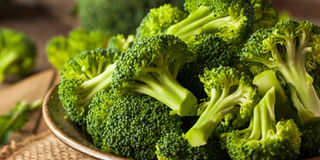For your health, eat more broccoli

Broccoli is a good source of B vitamins namely B9, also known as folate.
What you need to know:
- Research and studies over the years have confirmed that eating lots of fruit and vegetables, broccoli included, is associated with a lower risk of many health conditions.
Just like other green vegetables, broccoli has a lot of nutrients that are beneficial to the body. It is a nutrient-dense food although some nutrients are lower than others.
According to Regina Nantege, a nutritionist, it is low in carbohydrates and has a high content of fibre, vitamin C and K, B, A, and potassium, among others,.
While Broccoli can be nutritious, how you cook it also matters for the retention of nutrients.
Blood clotting processes
Broccoli, like other leafy vegetables, is rich in Vitamin K, a nutrient responsible for blood clotting according to Nantege.
This helps enhance self-healing processes, especially when one gets a cut. The fat-soluble vitamin is what enables your blood to form a clot through a process known as the coagulation cascade.
According to sfgate, an online portal, having excessive amounts of vitamin K is not dangerous. However, people with certain conditions, such as heart attack patients, and people on blood thinning medication, are not advised to taken in a lot of the vitamin. In this case, vitamin K, especially excessive or fluctuating amounts, may cause problems.
Antioxidants
Broccoli, according to Nantege, is a rich source of antioxidants with vitamin C, K and B-complex among other vitamins, used to form the protein that makes up skin, hair, tendons and blood vessels. These vitamins also lead to improved antioxidant status in stressed patients.
Studies, according to healthifyme.com, show that broccoli has the potential to lower oxidative stress levels. This is because broccoli contains antioxidants such as lutein and zeaxanthin, which prevent cellular injury and improve eyesight.
Broccoli also contains ascorbic acid and polyphenols that protect the Red Blood Cell membranes by getting rid of free radicals. Free radicals are chemical compounds that are missing an electron. They travel through the body causing damage to healthy cells in search of a spare electron.
Strong immunity
According to realsimple, an online portal, one’s immune system gains an extra layer of defense against illness by loading up on broccoli. The cruciferous powerhouse contains antioxidants that help repair damaged cells so they can better resist disease and illness.
‘‘Broccoli is loaded with two specific types of strong antioxidants, sulforaphanes and indols, which act as regulators of detoxifying enzymes that protect cells,’’ the site states.
Helps in weight loss
The reason broccoli is included in foods that help lose weight is because like every vegetable, it has a high fibre content.
“This makes one get satisfied quickly by filling up portions that would be filled by other high energy foods. In the end, one substitutes high energy foods with something low in energy,” Nantege says.
Nantege advises that broccoli alone will not lead to weight loss although it is a good substitute for high energy foods. One needs to incorporate it with other healthy foods and drinks to get preferred results.
Healthy pregnancy
Broccoli is a good source of B vitamins namely B9, also known as folate. According to Nantege, folate is important for pregnant women sinceit helps with neural tube development.
“Vitamin B and C are easily destroyed by heat. To gain those nutrients, therefore, one has to avoid overheating them and if possible, eat them raw. Therefore, cook the broccoli for less than seven minutes and do not throw away the liquid since it may contain some of vitamin B,” she says.
Cooking
Some prefer having roasted or grilled meat with broccoli on the side or boiled fish with steamed broccoli. You can also eat broccoli as a salad or juice. Remember to cook for less than seven minutes.
Downside
“While making a meal plan for someone with renal disease and is sometimes on dialysis, we advise them to take less potassium. One is, therefore, advised to forego foods high in potassium such as broccoli, potatoes and bananas or boil the foods and discard the liquid,” Nantege says.
Fortunately in Uganda, we have a number of options including amaranths (doodo), fresh okra, which have folic acid and other vegetables such as kale and collard greens, which are rich in fibre.




